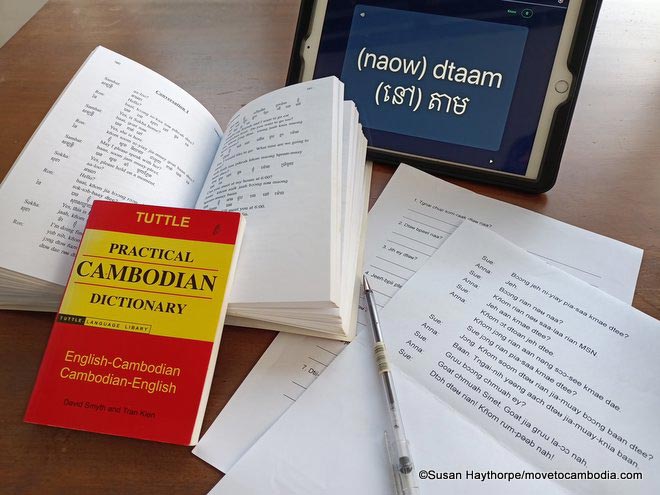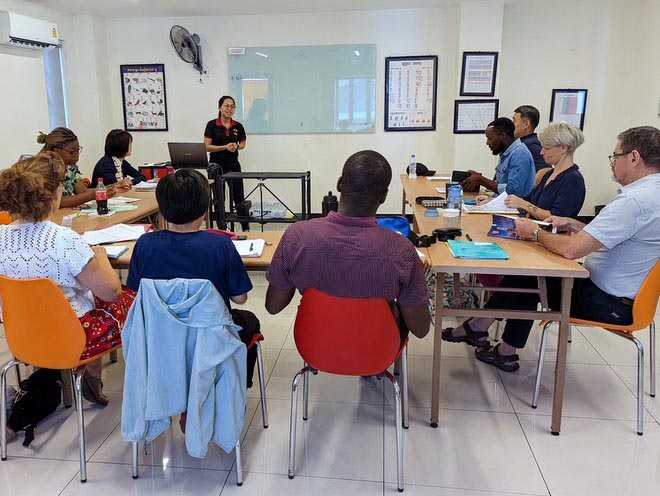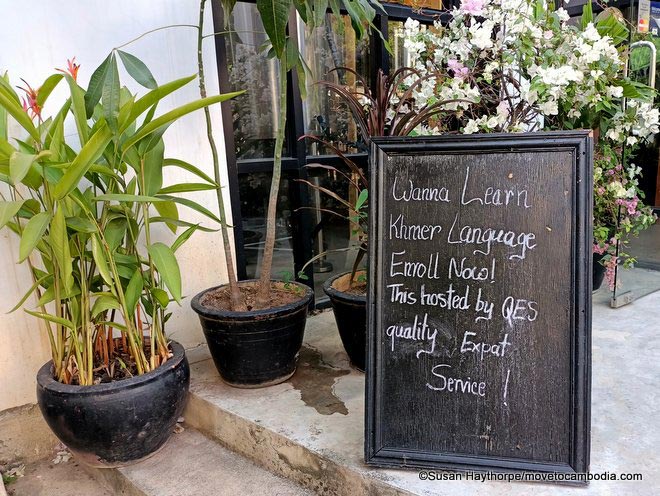“Jum riab sua. Knom chmuah Susan.” Likely the first words you’ll be taught (minus the ‘Susan’ unless that happens to be your name too) when you embark on the sometimes frustrating but ultimately rewarding journey to learning Khmer.

Living in Phnom Penh? Why not work on learning Khmer?
It’s fair to say that if you want to acquire a better understanding of a country and its culture you need to learn the language, and not just because it makes for more satisfying conversation with local people. A tutor told me you need a smiling face to pronounce many Khmer words — how lovely is that, a language that needs a smile to be spoken correctly?
The problem with Cambodia — or with Phnom Penh at least — is that such a large proportion of its population have good English skills, making it all too easy to take the lazy option and get by with minimal Khmer. The other problem is that the country not only has its own script, but there’s no universally-accepted Romanized version of that script as, say, the Chinese language has pinyin. When you do see it written in Roman letters the spellings can differ widely to the extent you may as well be looking at two different words. I’m told that if you learn to read Khmer script (I haven’t) it makes all the difference to getting to vocal grips with the variety of vowel sounds.
In fact the Khmer alphabet has no less than 23 vowels along with 33 consonants. That’s more letters than any other language. In other respects, it’s relatively simple; tenses are basic if used at all and the vocabulary less than extensive. The difficulty comes in trying to wrap the western tongue in particular around some of the sounds, and this is where a good teacher — and plenty of practice — brings dividends.

Learning the alphabet at Khmer for Foreigners at RUPP.
Most fellow students I’ve spoken to agree that one of their biggest problems when grappling with spoken Khmer is listening to and understanding responses to their attempts to communicate. Another is in being understood themselves; locals tend not to expect foreigners to speak to them in Khmer so our attempts are taken for foreign words they don’t understand. A good tip I’ve been given is to ease into the conversation with a Khmer greeting to alert the other party to the fact that you’ll be trying to speak their language so they’re prepared for your attempts and can reply more slowly. It says a lot about the good nature of Khmer people that they’re so appreciative of and happy to support the smallest of efforts.
Unless you’re in the fortunate position of having your lessons financed by an employer, the business of acquiring Khmer language skills can be quite costly over time so it’s just as well to be clear what your requirements are before you sign up for a course. Do you want or need the ability to read and write in Khmer, a process that will inevitably take some time and dedication; to become a reasonably fluent speaker to assist your job or relationships; or just to learn some basic Khmer to help you navigate day to day transactions? It can be a good idea to start with a short course to find out what’s right for you rather than sign up for months of tuition from the outset.
Recommendations are always useful so here’s a guide to some of the best-regarded Khmer language schools and tutors out there, based on my own experience and that of friends and colleagues.

A Gateway2Khmer class in progress. Photo provided.
Gateway to Khmer (G2K)
If you’ve got the time and commitment, G2K is a popular and effective choice. Tuition is classroom-based at the school’s campus building on Street 197 in the Tumnup Teok area of Phnom Penh, with a popular online learning option. The first three grades involve spoken Khmer from beginner status onwards, and from Grade 4 you’re learning to read and write Khmer script to eventual fluency. As part of Level One, students learn to use the International Phonetic Alphabet (IPA) as a guide to pronouncing the language’s complex vowel and consonant sounds. Classes are pretty intensive, there are end-of-level assessment exams and students are expected to put the homework hours, too, in order to keep up. Course prices start at $195 for 16 hours of tuition and rise to $495 for a full time course (60 hours), but considering the number of hours and the teaching quality it represents value for money for determined students of Khmer. The school also has a series of Kickstart Khmer classes — two weeks of learning the basics either in-person or online, without homework or assessments, and is a good intro to the school’s longer courses.
San Phalla
If you know someone who has been in Cambodia for a significant number of years and has sound Khmer skills, the chances are they were taught them by San Phalla. Phalla has been teaching Khmer to foreigners since 2000 and has excellent credentials. His courses, which cover all levels and include reading and writing Khmer, are well-structured but very adaptive to the student’s individual pace and requirements and his patient manner makes for stress-free learning. His classes are now online only, but for many people this is the most convenient way to learn. Prices are competitive at an hourly rate of $8 for one ($75 for ten lessons paid in advance). $10 per hour for two people and $4 each per hour for a group of four or more.

Wanna learn Khmer Language with Quality Expat Services?
Quality Expat Services
If you have a busy weekday schedule but still want to acquire confident Khmer in a more informal, low-pressure environment, the one-day-a-week courses run by Quality Expat Services are highly recommended. Classes, usually evenings and weekends, are held at various venues in central Phnom Penh, in a small group format (though one-to-one tuition can be arranged) and range from beginner to (so far) intermediate levels, including revision workshops. As the school is relatively new, additional courses are still being developed to meet students’ requirements. Teaching methods are thorough but lively and interactive. Tutor Sinet has excellent English and there’s plenty of opportunity for questions and discussion. Price per course is $100 for eight, one and a half hour classes.
Speak Like Khmer
Already a favorite among language students in Siem Reap, Speak Like Khmer language school opened new premises in Phnom Penh towards the end of 2022 at Derm Thkov in the Chamkar Mon district. The school operates a nine-level curriculum from beginners’ level to advanced. Classes range from intensive (two month course: two hours per day, Monday to Friday, cost $310) to part time (one hour per day, two, three or four days per week, from $85 per month). Schedules are flexible, with weekend and online classes available. The school also focuses on Cambodian Culture and holds regular Live Like Khmer classes and workshops, plus the short Khmer Survival course designed for language students who need to gen-up quickly on a particular subject.
Khmer Friends
The Christian organization Khmer Friends offers an affordable and flexible learning option (though I’m told teaching quality can vary according to the tutor you’re allocated). Classes start at $6 per hour for one to one tuition and $5 per hour for group study. All levels are covered, with the option of online learning and tuition outside business hours. Teachers will travel to students’ homes or offices for an additional fee.
Planta
This one, I admit, is untested by me or anyone I know. Health food cafe, Planta, on Palace Lane off Street 240 near the Royal Palace advertises walk-in, free-of-charge, informal Khmer lessons (though presumably you’ll want to buy some refreshments while you’re there) every Sunday from 4.00 p.m. to 6:30 p.m. If you decide to pop into one of these, do please report back here!
Khmer for Foreigners at RUPP
Finally, there’s the long-running Khmer for Foreigners at Royal University of Phnom Penh’s Institute of Foreign Languages. This course focuses just as much on reading and writing as speaking, and those who finish come out really knowing Khmer. Read the full review.
Learning khmer will certainly endear you to the locals. Although I’ve studied Khmer at different places, it was learning at Speak Like Khmer that accelerated my skills (the name is changing to Be like Khmer for legal reasons). It’s hands down the best place to learn. I learn via VIA ZOOM and on site. Their method is so clear and comprehensive. I learn one to one and participate in their cultural activities.